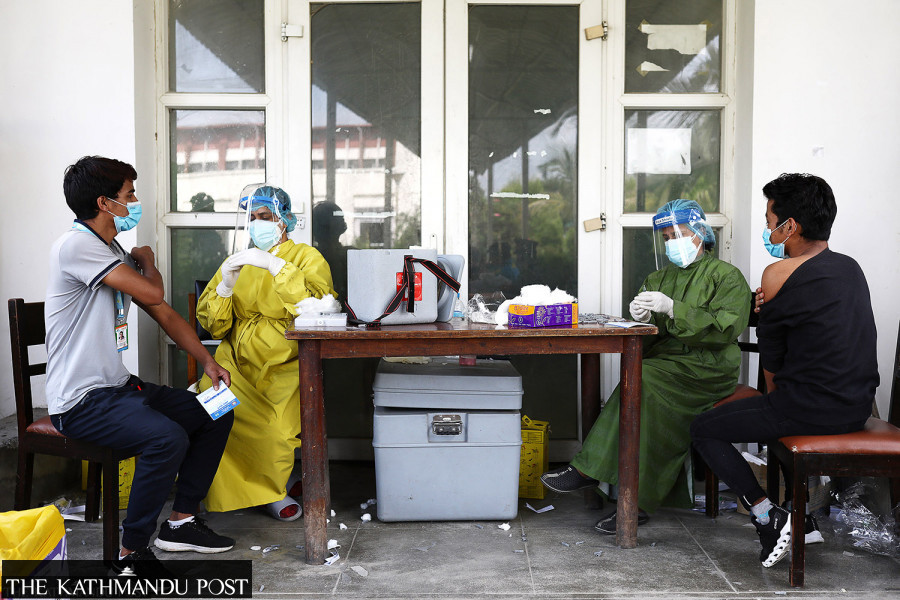Health
As Nepal’s own Covid vaccination deadline nears, several local units have stopped providing jabs
The government has decided to inoculate all eligible people by April 13 but only 69 percent of the population above 12 years has been fully vaccinated until Thursday.
Arjun Poudel
Last week, Bishal Gharti Magar from Sindhuli district, reached the urban health clinic run by the Kathmandu Metropolitan City with his wife for Covid-19 vaccination.
Health workers deployed there however, told him they stopped Covid vaccination months ago and suggested the couple visit either Bir Hospital or the Tribhuvan University Teaching Hospital for the jabs.
“My wife is seven months pregnant and has difficulty walking,” said the 24-year-old Gharti Magar, who works as a house painter in Kathmandu. “We returned home without getting a vaccine.”
Limited access to timely or convenient vaccination is one of the key challenges to boosting vaccination uptake and confidence in Nepal, according to a recent survey carried out by the Busara Center for Behavioural Economics, Common Thread and Save the Children. Uncertainty about the process and vaccine availability, lack of confidence in vaccination, limited endorsement of vaccination from religious and cultural leaders, inability to choose vaccine brand, are among the challenges to boosting vaccination uptake, according to the study.
Neither the Kathmandu Metropolitan City nor his local unit cares about the vaccination status of the Gharti couple. And what is concerning is that many local units including those in the Kathmandu Valley have stopped administering Covid vaccine.
“We have stopped the Covid-19 vaccination programme a month ago,” said Balaram Tripathi, chief of the Health Division at the Kathmandu Metropolitan City. “Coverage of the Covid-19 vaccine is very high in the metropolitan city and people also stopped seeking vaccination, so we stopped the immunisation programme.”
The government has decided to inoculate all eligible people with Covid-19 vaccine by April 13 but only 69 percent of the population above 12 years old have been fully vaccinated as of Thursday.
Experts say success of the vaccine in preventing Covid is dependent upon the number of people who take the vaccine.
The survey shows several reasons for the vaccine uptake below target levels, including availability of vaccines and personal reluctance or low confidence in getting vaccinated.
According to the survey, misinformation and rumours about the vaccine were common in the initial stages of the pandemic. Some women in particular were concerned about the vaccine’s impact on their fertility.
Rumours and concerns about side effects may still be prevalent in communities with low vaccination rates, while those who have seen neighbours, friends, and family members get vaccinated are less likely to be worried about side effects.
Many religious leaders - while not explicitly denouncing vaccination - have not actively endorsed vaccination. For those who are uncertain about the vaccine or who lack confidence in the vaccine’s safety and efficacy, there is a missed opportunity for religious leaders to encourage their communities to get vaccinated, the survey said.
Due to limited supply, vaccines are only available on specific days, and at specific times and locations.
“For those who work during the day or go to college, it is difficult to make it to the vaccination centres on time,” the report stated. “For those who are elderly or lack the means to access transportation, walking long distances to health facilities for vaccination is a significant barrier.”
Several respondents mentioned feeling frustrated when they visited a health facility for vaccination only to be told that there were no vaccines available at the time.
The organisations, which carried out the survey completed in-depth interviews with 24 adults as well as a quantitative survey with 500 unvaccinated people in Madhesh Province to uncover barriers and enablers to vaccination.
Officials at the Health Ministry however, said that Covid vaccination is not an issue as 81.7 percent of the population above 18 years has been fully immunised.
“I don’t think Covid-19 vaccination is still an issue, as we have already inoculated over 80 percent of the population above 18 years old,” said Sagar Dahal, chief of the National Immunisation Programme. “If you count the number of migrant workers and others who are abroad then you will find the number of unvaccinated people to be very low.”
According to Dahal, his office had asked local levels to organise final round vaccination, continuing from some centers to those, who have not taken the vaccine yet and explore the possible pocket areas, where, number of unvaccinated population are a lot.
The study has also offered suggestions to increase vaccine uptake including sharing up-to-date information, promoting pro-vaccine testimonials from religious and community leaders, leveraging existing religious festivals and events, and bringing vaccines to religious centers.
Likewise the report also suggests framing all vaccination as better than no vaccination, emphasizing similarities amongst vaccines, enabling health workers to present information about vaccine side effects with comparisons to Covid itself and other vaccines, leverage people’s positive experiences, build skills for health workers to discuss clients' vaccine concerns with confidence.
So far 11,951 people died of Covid-19 and 1,118,396 people tested positive to Covid-19 since the start of the pandemic in Nepal.




 11.84°C Kathmandu
11.84°C Kathmandu















